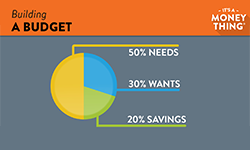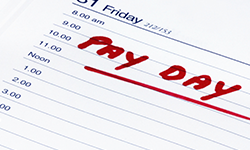
Many of us have intentions to be better organized and to save money. However, it can be difficult to focus or change potentially harmful habits that have been instilled over time. The good news is, you don't have to be an organizational whiz to straighten up your finances. We're sharing a few simple steps you can implement to help get your finances in order.
Create a Budget
One of the first steps to having more organized finances is knowing exactly how much money you have coming in and going out each month. Taking a serious look at where your money goes, can help you identify potential areas where you can cut back and increase savings or free up funds for other expenses. Creating a manageable budget that allows for adjustments is key. When reviewing your budget, you may find that some months require more spending than others. For example, depending on how you heat and cool your home, your gas bill may increase during the winter or your electric bill may increase during the summer months. With a budget, you can confidently adjust your spending accordingly to keep on track with your financial goals.
Track Spending
One of the simplest ways to keep your finances organized is by tracking your spending. It can be easy to assume you're on track with your budget when you don't see where your money goes. Track your income and expenses by keeping a log or check register, using a spreadsheet program on your computer, or a budgeting app on your mobile device. Don't depend on the balance you see in your account to determine how much you can spend. It's easy to forget about recurring expenses, small purchases, and overlook funds or expenses that may be on hold or pending.
Keep Track of Payment Due Dates and Automate Bill Paying
With the number of recurring expenses we have each month, it's nearly impossible to keep track of all the due dates in your head. To help make sure you pay your bills on time, notate when your utility bills, credit cards, loan payments, subscriptions, memberships, and other recurring monthly payments are due on your calendar. Set notifications on your phone as a reminder and automate or set up bill pay for expenses like utilities, loan payments, and membership fees.
Set a Savings Goal and Automate Saving
It's easier to set money aside when you have a goal in mind. Whether you're saving for a vacation, new car, home, retirement, potential emergency, or something else, consider automating your savings. Save regularly with automatic payroll deduction, direct deposit, or set an amount to transfer to your savings every week.
Invest in Your Future
If the company you're employed at has an employer-sponsored retirement plan like a 401(k), consider enrolling in it as soon as possible, especially if your employer matches a portion. That way, you can begin contributing a portion of each paycheck to it and start easily saving for retirement. You should also consider opening a retirement savings account like an Individual Retirement Account (IRA). Depending on the type of IRA you open, contributions may be tax-deductible or withdrawals may be tax-free.
Seek Credit Counseling
We all need a little help sometimes and working with a credit counselor can be extremely beneficial to helping you get your finances organized. Credit counselors can help you create a budget, map out a debt repayment plan, and offer advice on ways to improve your credit, among other things.
Members First sponsors the Louis Maygarden Center for Financial Literacy's counseling services at the University of West Florida. The Maygarden Center for Financial Literacy offers free credit counseling and is open to all individuals in the community. Additionally, our members can request an appointment to speak with a credit counselor at our Garden St. or Nine Mile Rd branch locations.
Keep Joint Accounts Balanced
With more than one person on an account, it can be easy to overdraw or have insufficient funds with a joint checking account. Like with your own personal checking account, you should track spending. Keep a shared spreadsheet that you and other joint account holders can update when a deposit or withdrawal is made from the account. Let other account holders know about all transactions and consider keeping a self-imposed minimum balance on the account so you'll be covered against having your joint account overdrawn. You should also consider setting up notifications or alerts on internet banking or mobile banking for account transactions, low balances, transfers, and withdrawals from the account. This will ensure that you're notified when the balance is low or falls below your target threshold.
RESOURCES
« Return to "Blog"











